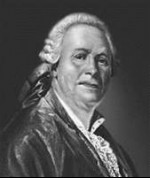| Christoph Willibald GluckComposerHis father was a forester in the Upper Palatinate (now the western extreme of Czechoslovakia); Czech was his native tongue. At about 14 he left home to study in Prague, where he worked as an organist. He soon moved to Vienna and then to Milan, where his first opera was given in 1741. Others followed, elsewhere in Italy and during 1745-6 in London, where he met Handel‘s music. After further travel (Dresden, Copenhagen, Naples, Prague) he settled in Vienna in 1752 as Konzertmeister of the Prince of Saxe-Hildburghausen‘s orchestra, then as Kapellmeister. He also became involved in performances at the court theatre of French operas comiques, as arranger and composer, and he wrote Italian dramatic works for court entertainments. His friends tried, at first unsuccessfully, to procure a court post for him; but by 1759 he had a salaried position at the court theatre and soon after was granted a royal pension.
He met the poet Calzabigi and the choreographer Angiolini, and with them wrote a ballet-pantomime Don Juan (1761) embodying a new degree of artistic unity. The next year they wrote the opera Orfeo ed Euridice, the first of Gluck‘s so-called ‘reform operas‘. In 1764 he composed an opera comique, La rencontre imprevue, and the next year two ballets, he followed up the artistic success of Orfeo with a further collaboration with Calzabigi, Alceste (1767), this time choreographed by Noverre; a third, Paride ed Elena (1770), was less well received.
Gluck now decided to apply his new ideals to French opera, and in 1774 gave Iphigenie en Aulide(as well as Orphee, a French revision of Orfeo) in Paris; it was a triumph, but also set the ground for a controversy between Gluck and Italian music (as represented by Piccinni) which flared up in 1777 when his Armide was given, following a French version of Alceste (1776). Iphigenie en Tauride followed in 1779 - his greatest success, along with his greatest failure, Echo et Narcisse. He now acknowledged that his career was over; he revised Iphigenie en Tauride for German performance, and composed some songs, but abandoned plans for a journey to London to give his operas and died in autumn 1787, widely recognized as the doyen of Viennese composers and the man who had carried through important reforms to the art of opera.
Gluck‘s opera reforms - they are not exclusively his own, for several other composers (notably Jommelli and Traetta, both like Gluck French-influenced) had been working along similar lines - are outlined in the preface he wrote, probably with Calzabigi‘s help, to the published score of Alceste. He aimed to make the music serve the poetry through its expression of the situations of the story, without interrupting it for conventional orchestral ritornellos or, particularly, florid and ornamental singing; to make the overture relevant to the drama and the orchestration apt to the words; to break down the sharp contrast between recitative and aria: ‘in short . . . to abolish all the abuses against which good sense and reason have long cried out in vain‘. Orfeo exemplifies most of these principles, with its abandonment of simple recitative in favour of a more continuous texture (with orchestral recitative, arioso and aria running into one another) and its broad musical-dramatic spans in which different types of solo singing, dance and choral music are fully integrated. It also has a simple, direct plot, based on straightforward human emotions, which could appeal to an audience as the complicated stories used in contemporary opera seria, with their intrigues, disguises and subplots, could not. He had a limited compositional technique, but one that was sufficient for the aims he set himself. His music can have driving energy, but also a serenity reaching to the sublime. His historical importance rests on his establishment of a new equilibrium between music and drama, and his greatness on the power and clarity with which he projected that vision; he dissolved the drama in music instead of merely illustrating it. | |
 Mariinsky Theatre:
Mariinsky Theatre:  Mariinsky-2 (New Theatre):
Mariinsky-2 (New Theatre):  Mariinsky Concert Hall:
Mariinsky Concert Hall: 

